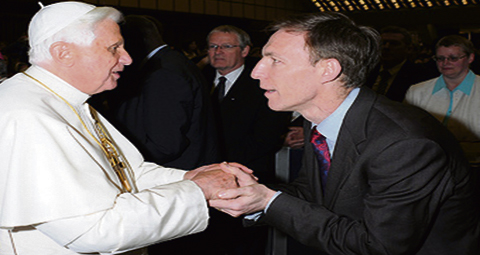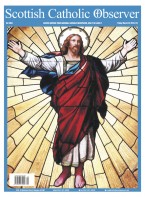BY Liz Leydon | January 9 | ![]() 0 COMMENTS
0 COMMENTS ![]() print
print

Jim Murphy is a man on a mission
The first in a series of interviews with Scottish political party leaders sees SCO editor Liz Leydon ask the new Scottish Labour leader Jim Murphy MP, a Catholic, to stand up for what he believes in ahead of this year’s general election. Extracts below.
New Scottish Labour leader Jim Murphy—like many career politicians —is unlikely to have risen to where he is in politics today by showing his entire hand. So, on a sub-zero Monday between Christmas and New Year, after hard-fought Better Together and Scottish Labour leadership campaigns, the SCO expected the arrival of a somewhat jaded figure, plus extended entourage, in need of thawing. Not the case. Mr Murphy was relaxed, softly spoken but no soft mark, his angular frame mirrored his sharp mind. His answers were considered and measured, refreshing in today’s sound-bite culture, but not lacking in self-deprecating humour.
Taking the reins as Scottish Labour leader on the back of his pro-union 100 towns, 100 days Better Together campaign, Mr Murphy, the product of a Scottish Catholic Primary education and extended student career, admitted that Labour has ground to make up with Scottish voters. He, therefore, sent a firm message for traditional heartland supporters: “I am a new leader and this signals a new start for Labour in Scotland. Tactical or protest voting in this year’s general election dangerously increases the risk of David Cameron and his government being returned to power by default.”
Faith
Elected to the House of Commons in 1997 as MP for East Renfrewshire—a safe Conservative seat until that point—the first time he stood for election, and after a long and prominent career in Parliament, why Scottish Labour leader now? Could it have something to do with Mr Murphy’s famous question: “You can be a Scot and be Prime Minister. But can you be a Catholic and Prime Minister of the United Kingdom?”
“There are many reasons I have never been elected Prime Minister, I don’t think my Faith topped the list,” he said wryly. “I have personally experienced no discrimination at all in the Labour Party. “There has not been a Catholic First Minister in Scotland either, but I aim to change that in 2016.”
It was, in fact, because of his Faith that he was able to play such a pivotal role in the 2010 Papal visit, first as a minister meeting Pope Benedict XVI in Rome in 2008 (right) and then as a shadow minister when the Holy Father came to Scotland.
“I found myself in Papal visit meetings with Vatican and Foreign Office officials and I could barely believe it was happening,” he said
While Mr Murphy remains cautious about talking about his immediate political future, whether that be as an MP, or as both an MP and an MSP or as ultimately an MSP only, he readily admits he was among the politicians who voted in favour of Scottish devolution. He told the SCO he originally saw the Scottish Parliament as a forum for ‘a different generation of politician.’
Now, however—with more and more power being devolved—the political playing field has changed, he said
Scotland and the world
Mr Murphy would not be drawn on whether taking a prominent role as a public spokesman for the Better Together campaign made winning—and taking on—the role of Scottish Labour leader harder for him, nor on whether his campaign before the independence referendum last year would have carried more weight if he had already been opposition leader in Scotland at the time.
One thing he is clear on, though, is the difference between Scottish and Irish nationalism, in his view as a Scot with Irish ancestry. “Irish nationalism is actually about reunification,” he said. “It is ultimately about Northern Ireland leaving Great Britain and coming together with the South. Scottish independence, on the other is about breaking up the union. These are not the same thing.”
While the former Labour Shadow Secretary of State for Defence does not see nuclear disarmament as a ‘life’ issue, he does ‘want rid of all nuclear weapons,’ including the UK’s Scottish-based Trident missile arsenal. “The debate today is about the best way of getting rid of them—multilateral or unilateral disarmament,” he said. “We cannot dis-invent the knowledge but there is honest disagreement between unilateralists and multilateralists about how we achieve the same thing.”
Mr Murphy does not see the UK scrapping its nuclear arsenal without a quid pro quo agreement as a positive step.
“Our unilateral disarmament would not impact nuclear programmes in Russia, China, the US, the sub continent or the Middle East,” he said, the latter being an area of great personal interest to him and his constituents.
“If we hold the minimum credible nuclear deterrent, however, then we can sit around the international table and take part in global disarmament talks.”
Sectarianism
Mr Murphy does not fall into the trap of blaming the victims of sectarianism for the existence of the problem—labelled as ‘Scotland’s shame’—nor does he see recent SNP attempts to legislate against it in the sporting arena as effective.
A former pupil at St Louise’s Primary School, Arden, before his family moved to South Africa, Mr Murphy said he is 100 per cent supportive of state-funded Catholic education and that he is completely in favour of people of faith being able to educate their children according to their religious beliefs.
“This is not up for discussion,” he added. “Faith-based education in Scotland is a permanent commitment for me.”
He is also proud of Scotland’s Jewish schools, and Catholic-Jewish campus plans. Mr Murphy, however, has experienced anti-Catholic bigotry in his professional life, through historic prejudice tolerated in an increasingly secular political arena and society. He spoke of the first time he swore an oath to become part of the Privy Council. As a Catholic, he had to swear a different oath to his non-Catholic peers on not being influenced by a foreign power, for example the Vatican.The Scottish Government’s own attempts to put the issue of anti-Catholic bigotry firmly in a football box has not gone down well with this football fan either.
“The Offensive Behaviour at Football and Threatening Communications (Scotland) Act 2012 is the worst type of legislation,” he said of the bill that he has vowed to abolish if he becomes First Minister.
“It is a classic case of a bill written because ‘something had to be seen to be done.’ “Sectarianism is a problem that runs much deeper in Scottish, and particularly Glaswegian, society than what happens at a football match. It existed long before Celtic and Rangers Football Clubs were founded. The nationalist Scottish Government’s passing of this law has not dealt with the problem.
“We shouldn’t pretend there is an overnight answer to the problem. We must work tirelessly and relentlessly in schools and in the media to eradicate it.”
It’s complicated
Mr Murphy believes in politicians being allowed to follow their conscience, but would not be drawn on the case of the two Scottish midwives who discovered before Christmas that the Supreme Court in London had ruled against them being allowed to do the same over abortion. He considers himself close to MP Tom Clarke but, at the time of the interview, Mr Murphy said he had not spoken to his peer about the case of Mary Doogan and Concepta Wood which Mr Clarke intends to take up in the House of Commons, as reported in the December 26 2014 edition of the SCO.
Mr Murphy faces the uphill task of wooing in particular West of Scotland males back into the Labour fold but, while he shares a passion for football like many of his peers, his tee-total and vegetarian lifestyle adopted during his days at university set him apart. On pro-life issues, the new Scottish Labour leader’s views on abortion are at odds with those of the Catholic Church yet he is in complete agreement with the Church in his stance against assisted suicide.
He wants rid of nuclear weapons, but sees that happening only through global agreement on the matter. He is as comfortable on a family holiday in Blackpool as he is at home in Scotland or retracing his grandparents’ roots in Donegal. He is as at ease in the political limelight as he is in the SCO offices. One of the key issues and the question that remains for voters: Is Labour’s Jim Murphy what Scotland’s Catholic community needs now?
One fact is for certain: the Scottish Parliament has not seen the likes of Mr Murphy before.
— The SCO aims to interview each of the Scottish party leaders prior to this year’s general election











